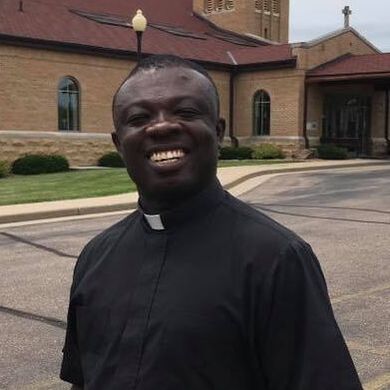|
According to Mother Teresa, ”If we have no peace, it is because we have forgotten that we belong to each other.”
The web of the modern culture of secularism, individualism, materialism and hedonistic lifestyle seem to have pervaded our society; even including marital homes and families. This intrusive phenomenon has corrupted our minds and hearts. Due to this, human beings in this 21st century contemporary society places more premium and value on their wealth, money and property than on an other fellow human beings. Therefore, the rich and the wealthy have become complacent and self-indulgent. They think more about their comfort than sharing with others; especially the poor, the needy and the unfortunate one's in the society. It is for this reason that the author (Amos) of our first reading warns against the selfish and extravagant use of wealth. The rich only think about their comfort and themselves at the expense of the poor and the needy in their society. He spells woe and indicates God’s vengeance on people who refuse to share their wealth with the poor, needy and the suffering. This is what the Israelites did that brought about the punishment of God on them by sending them into exile. Brothers and Sisters in Christ, we live in a society where we have been brainwashed into thinking that the end justifies the means. People always take advantage of the weak and the unfortunate ones in the society to manipulate them to suit their personal comfort and interest. The rich use their money and power to perpetuate social injustice and corruption of moral principles. But as Christians, we must know that money, power and wealth are gifted us by God to support the poor, needy and suffering in the society but not for our personal luxury and comfort. Share with people what you have. You may be the hand of God that answers the prayer of somebody. Use your wealth to gain your salvation. In connection to our gospel reading Jesus Christ uses a parable about the drama of the rich man and the poor man, Lazarus to diffuse three misconceptions and false doctrines held by the Pharisees and the Sadducees. These included: 1. That material prosperity was a reward from God in life for being self righteous. Also, poverty and sickness were perceived to be punishments from God because of ones’ sins. Therefore, the poor and the sick have been cursed so there is no need to associate with or to help them. 2. That wealth was a blessing from God, so the way to appreciate and thank God was, after paying the portion of ones' Tithe, to enjoy life by eating, drinking and dressing to show off. 3. The Sadducees defended wrongly a false doctrine that there was no resurrection, so the human soul stood no chance of survival after the death of man. There was no retribution for ones’ deed and neglect of doing the right things. Life was all about ”here and now;” no judgement. This encouraged hedonistic lifestyle. So Jesus used this parable to debunk these misconceptions by insisting that we have to be generous with people. Show mercy to the plight of the poor and the needy. Also, to remind ourselves that retribution and judgement await us after our life here on earth. Then, we should be conscientious in treating people well and do good all the time. Sharing is caring. Our sense of love, care, concern to the situation of the suffering, poor and the needy is a gateway to our salvation. Therefore, Apostle Paul, in our second reading encourages us to pursue righteousness, devotion, faith, love, patience and gentleness. Meaning, we should not allow ourselves to be deceived by the world that life is all about wealth, money, power etc. But rather, these are only transient gifts given us to better our fraternity, faith and to support others. Your life and salvation do not depend on these gifts, but on God and how we use them. Remember what the Psalmist echoed, ”Blessed is he who keeps faith forever, secures justice for the oppressed, gives food to the hungry...” This is what made the saints heroes. Are you ready to be one? May God bless you and all you do. Enjoy the chills of the fall season. Fr. Emmanuel Comments are closed.
|
Fr. EmmanuelFr. Emmanuel hails from Ghana and is passionate about the Gospel and bringing the love of Christ to all people. He speaks several languages, enjoys soccer and cooking, and loves St. Francis of Assisi. Archives
April 2021
Categories |

 RSS Feed
RSS Feed